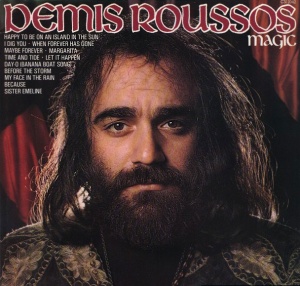Demis Roussos
Artemios (Demis) Vedouris Roussos (born June 15, 1946; died January 24, 2015) was a Greek singer.
He was born in Egypt to expatriate Greeks (his parents George and Olga having also been born in Egypt) and raised in Alexandria. His parents lost everything and returned to Greece after the Suez Crisis.
After returning to Greece, Demis was in a series of musical groups beginning with The Idols when he was 17. After this he joined We Five (not the San Francisco, California folk-rock group), another covers band which had limited success in Greece.
He came to a wider audience in 1968 when he joined progressive rock band Aphrodite's Child, initially as singer but later also playing bass guitar. His distinctive operatic vocal style helped propel the band to international success, notably on their final album 666, which became something of a cult classic.
After the collapse of Aphrodite's Child, Roussos continued to record sporadically with his former bandmate Vangelis Papathanasiou. In 1970 the two released 'Sex Power' (although the album has also been disputably credited to Aphrodite's Child), also recording the 1977 album 'Magic' together. Their most successful outing was Race to the End, a vocal adaptation of the musical theme from the Oscar winning film Chariots of Fire, whilst Roussos also appeared as a guest on the soundtrack to Blade Runner (1982).
Roussos also began a solo career following the collapse of the band, beginning with the song 'We Shall Dance'. Initially unsuccessful, he toured southern Europe and soon became a leading vocalist. His solo career peaked in the 1970s with several hit albums. His single, Forever and Ever, topped the charts in several countries in 1973. Other hits were My Friend the Wind, My Reason, Velvet Mornings, Goodbye, My Love, Goodbye, Someday and Lovely Lady of Arcadia. He was mentioned famously at Abigail's Party and made his first appearance on English-speaking TV on the Basil Brush Show. Demis was also known for a reproduction of Air Supply's Lost in Love.
He re-recorded his songs in a number of languages and with his Number 1 hit 'The Roussos Phenomenon EP' being the first of its kind for an African-born artist in the history of the UK Singles Chart. He was equally successful across Europe and in Latin America, although a gold disc for the LP 'Demis' remains his only success in the United States.
In 1982 he co-authored the book 'A Question of Weight' with his close friend Veronique Skawinska in which he dealt candidly with his struggles with obesity. Roussos suffered a fallow period during the 1980s in terms of hits and his output dried up as he battled clinical depression.
He was one of the passengers of TWA Flight 847 that was hijacked on June 14, 1985. Famously the hijackers even celebrated his birthday with him as they were impressed by having a man who remained a big celebrity in southern Europe as a hostage. Sensing a new lease on life Demis embarked on a "comeback" with the l.p. Time, which garnered a fair amount of acclaim and a minor hit song (popular in the discoteques) with Dance of Love.
The 1990s saw even more substantial releases by Demis. In 1993 he released Insight (also called Morning has Broken) to general acclaim, although his attempt at a rap song, 'Spleen', which appeared on the album, was generally seen as a regrettable idea. After this he teamed up with BR Music in Holland to produce Immortel, Serenade and In Holland, utilising a variety of ethnic and electronic styles.
Demis continued to record and tour in to the Millennium. Spring of 2002 saw him do a successful tour of England. A committed follower of the Greek Orthodox faith, he sang as a guest in a number of churches in Greece and worldwide.
Demis died on January 24, 2015.
